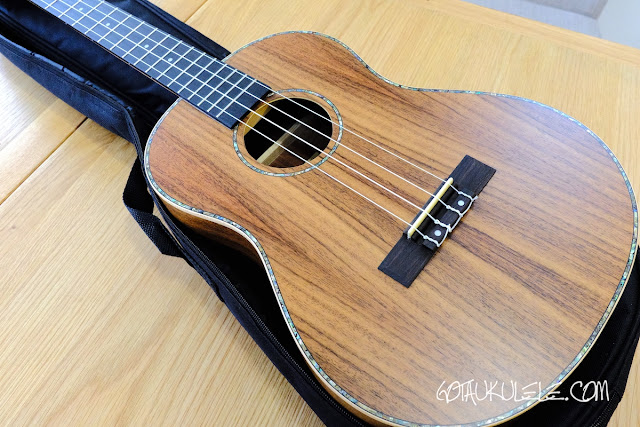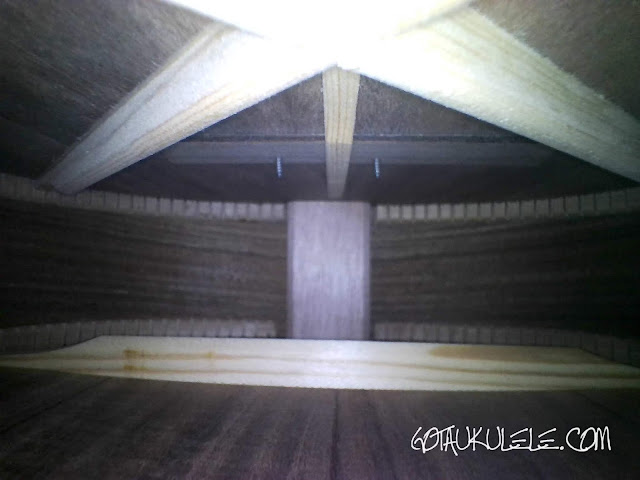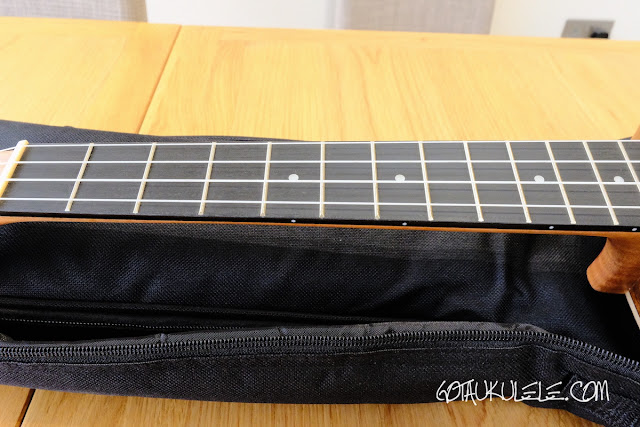I know all too well that I don't feature enough baritone ukuleles on Got A Ukulele. It's not through want of trying, I can assure you as I love them. They just don't seem to come up too much in the requests I get from brands. I'm glad to help redress the balance a bit today with the Isuzi EAK-B Baritone ukulele.
Isuzi are a far eastern brand that I have featured once before in the form of their QM-T Tenor ukulele. I found it was a likeable instrument, but struggled with some of the looks (a purely subjective thing). Still, it had promise. So I was pleased to hear from Red Chilli Audio, their UK distributors recently asking me to look at this baritone. Thanks to them for the loan instrument.
The EAK-B baritone is a standard scaled and shaped double bout instrument that is quite the looker compared to your common or garden mahogany ukuleles on account of the wood choices. It is all laminate wood, but with a very attractive outer veneer. The 'EAK' in the title stands for 'East Asian Koa', which is an immediate gripe for me i'm afraid. Technically speaking there is no such thing as Asian Koa. The word 'Koa' is a local Hawaiian naming convention and should only be used for Acacia wood grown on the Hawaiian islands. So this is the very same wood, but because it's from East Asia, it's more accurately named as Acacia. I have no issue with it being acacia, it's the same tree, so why not say that? The reason some brands don't is that 'Koa' comes with a certain mystique and price tag, when Acacia does not. Anyway, laminate acacia it is and because of that it's stripy and attractive. It has a warm chocolate orange colour to the wood grain and whilst it's not the most strikingly stripy acacia I have ever seen (and there is certainly no flaming), it's handsome enough. The top, back and sides are all made from two pieces and the bookmatching works nicely.
The bridge is a tie bar style from an unspecified dark wood (walnut perhaps, though it is VERY dark so there is an outside chance it's ebony or an ebony relative. Saying that it could just be stained too) and is fitted with what looks like a bone saddle with a straight top. No complaints here and I like how dark it is and well finished. It's tidy.
Decoration here is provided with cream binding strips to the top and back with an outer purfling strip on the top of abalone. That binding actually looks like maple, so no plastic here and it looks great. The abalone is repeated on the sound hole rosette and works very nicely with the acacia. As much as I don't go in for glitzy decoration on ukuleles, this is a combination that I know works well and I have seen before on acacia. The body is then finished in an open pore satin and is done very nicely all over.
Inside is very tidy too with no glue or wood shavings I can see. The linings are notched, the braces not over done and the top is X braced. Looking at the edge of the sound hole and you can see that despite it being laminate it's not over thick either.
The neck is made of mahogany and in three pieces witht the joints at the heel and headstock being very well disguised. The profile on the back of the neck at the nut is pleasingly flat rather than your normal far eastern 'broom handle' an it has a roomy 'enough' 37mm nut with with 30mm G to A. It is a baritone though of course and that is to be expected.
It's topped with more dark unspecified wood which is almost black in colour and looks great. I still wish they would specify the wood as I have a suspicion this is just stained black. You get 18 frets in total with 14 to the body top and they are dressed well, helped by the fact that the edges are bound in dark wood to hide the ends. Pearl dot markers face out in the usual 5th, 7th, 10th and 12th spots and these are repeated with dots on the side. Excellent.
Beyond the bone nut is a rather plain shaped headstock holdin the Isuzi logo in a laser etch. It's not just a plain shape though (which I normally like), but plain looking too. At first glance I thought it was just a continuation of the mahogany neck wood, but think it is actually an acacia veneer. If it is a veneer, it's very pale looking and doesn't really match the chocolate colour of the body. Some more stripe would do wonders here.
Tuning is provided by sealed gears in jet black which look nice against the pale mahogany wood and work well. No complaints so far.
Your package completes with a set of Aquila strings and a functional soft branded gig bag. And for those who find Baritones can be a bit pricey, they will no doubt be pleased to see that you can pick one of these up for an reasonable £150 in the UK. A good price, though not unheard of for entry level baritones of course.
You can probably tell from the above that I have found very little majorly wrong with this instrument thus far. It's a standard design and perhaps not kicking it out of the park on startling looks, but that doesn't mean it's unattractive. The build and finish throughout is also good. Picking it up and I don't find it too heavy and it sits nicely balanced in the hands. Not much wrong here either. Not a 'massisve' head turner, but still a nice looking instrument. Setup too isn't bad. The nut is just perfect for me, and whilst I would take the saddle down a little, it's not beyond normal limits.
Tuning it up to play threw me a little though I must admit. I naturally assumed G tuning, being a baritone and all and tuned up to DGBE. Extremely floppy and loose! It turns out that Isuzi send these out with strings for re-entrant C tuning. Now.. I have no issue with that, and I suppose it does help absolute beginners, but bear in mind that I have written before about how it ISN'T actually difficult to work with alternative relative tunings on ukulele. (If you can count to 7 you can do this..). I'm just more of a fan of a baritone in G tuning sound wise as it is what I find helps set them apart from other scales. I also found it strange to find that it's a high G which also seems to go against what a baritone is about. Ho hum. I am not going to adjust the review scoring for something like this, not least because it is no issue to re-string this in DGBE. I just found it odd and perhaps a case of dumbing down in the uke world. What it did also show me though was that the tuners are a little on the cheap side with quite a lot of variance in tension between them I know that because of the extra winding required to get it up to C tuning! They are not all that great i'm afraid.
Volume, resonance and sustain are all very good here. Strumming the instrument directs a pleasing vibration back into your chest and the whole thing feels lively. That's a nice thing as I sometimes find that baritones at the cheaper end can feel a bit dark and muddy, almost strangled. Of course the C tuning is helping here, but there is still quite a lot of dynamic range to the sound with lows and mids coming through alongside the highs, despite that high G string. The C tuning is actually making it a bit harder for me to review though as I am expecting baritone tones, but getting 'big tenor'! As I say though, they are easily changed.
Tuned as it is, it strums as a capable, clear and pretty sounding ukulele. There is a 'touch' of laminate boxiness going on in the strummed sound that I can detect, something I find is amplified with larger sound box ukuleles. I've heard much worse though, but it is there. But hey, it's only £150 - we are not dealing with a Kamaka here. It works well though and is enjoyable to play.
Fingerpicking, like with so many baritones, is a real pleasure on account of that increased resonance. I find the neck particularly comfortable for this style and the sustain and chimey tone really makes the higher notes sing. I could sit and play it like this all day. In this form it loses the slight boxy edge and sounds very pretty to my ears. Nice.
And if the review seems a little short on the sound stakes you shouldn't take that as a bad thing. It's a £150 laminate baritone, it's not going to set the world alight, but it IS a very playable nice sounding instrument in which I am probably nitpicking. Yes, I'd like a bit more character, but there isn't a great deal shabby here. All in all though despite one or two minor gripes and what I still think is an odd 'out of the box' tuning choice, this is a good all round instrument. It's made well, looks good and sounds nice too. The price is attractive enough, (but can be beaten of course). But still, £150 for a baritone that looks like this is really not a lot of money. As such, it gets a firm Got A Ukulele recommendation and I think is worth tracking down if you are baritone curious without a huge budget! And thanks again to Red Chilli Audio for the loan model.
http://www.isuzi.co.uk
http://www.redchilliaudio.com
UKULELE SPECS ROUNDUP
Name: Isuzi EAK-B
Scale: Baritone
Body: Laminate Acacia
Bridge: Unspecified wood - tie bar
Saddle: Bone
Neck: Mahogany
Fingerboard: Unspecified
Frets: 18, 14 to body
Nut: Bone
Nut width: 37mm, 30mm G to A
Tuners: Sealed gears
Price: £150
UKULELE PROS
Good general build and finish
Excellent volume
Good sustain and resonance
Nice neck profile
Clear tone with good dynamic range
Good price
UKULELE CONS
Tuners are not great
Plain headstock looks could do with more acacia
Please don't call it Koa...
'Slight' laminate boxy edge to tone
UKULELE SCORES
Looks - 9 out of 10
Fit and finish - 8.5 out of 10
Sound - 8.5 out of 10
Value for money - 9 out of 10
OVERALL UKULELE SCORE - 8.8 out of 10
UKULELE VIDEO REVIEW
© Barry Maz
WANT TO LEAVE A DONATION TO HELP KEEP THE SITE GOING?

THANKS!











As a soprano guy, you ALMOST manged to persuade to want this one.... keep up the good work.
ReplyDeleteThank you for another great review. The first fret seems to be lifting up from the fretboard (picture 6). Could be me though - my eyesight isn't what it used to be.
ReplyDeleteTrick of the light. Just checked it and it’s Flush
Delete